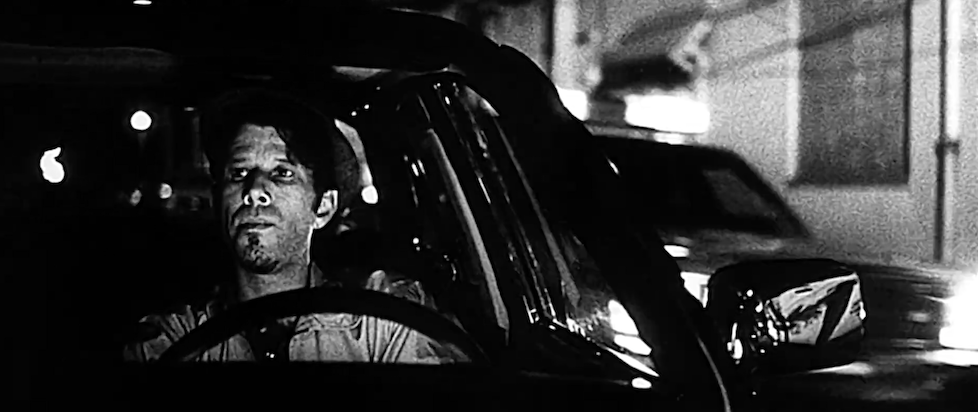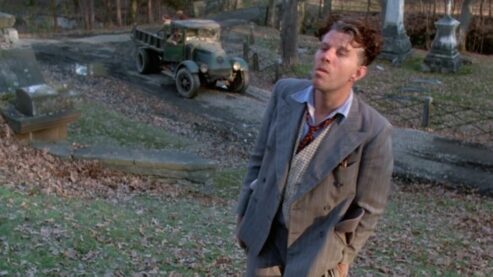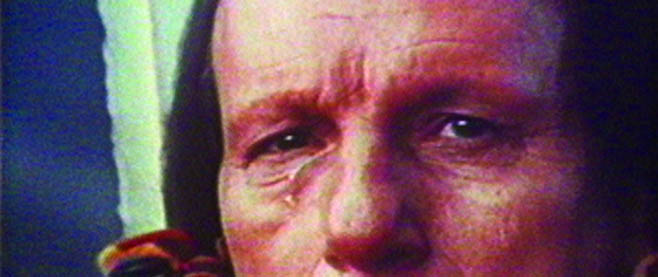
Tom Waits, Movie Star
On December 7, 2024, Tom Waits – singer, raconteur, Sagittarius – turns 75. For over five decades he has built an expansive music career with a reach that spreads from Beat poetry to Delta blues, from show tunes to the avant-garde. But alongside this body of work is a second career in screen acting, and a filmography that would make any full-time character actor proud. More than a genre-hopping oddity or bit of celebrity stunt casting, Waits’ contributions to cinema have been as compelling and eclectic as the man himself. As an icon of the weird and the weary, the films of Tom Waits hold many pleasures for those who care to look.
After some bit parts that largely overlap with his musical persona – pianomen, barflies and creeps – Waits’ first starring role came in 1986 with Jim Jarmusch’s laid-back prison film Down By Law. Waits plays Zack, a laconic New Orleans DJ unjustly incarcerated with John Lurie and Roberto Benigni. Down by Law is a film about stasis, and for much of the runtime Waits is doing very little but sitting in the slow anguish of the jailbird. It would be a test for any actor, and Waits commands the screen with blackly comic angst. In the post-modern cool of Jarmusch, Waits found a friend and kindred spirit – the two would continue to collaborate, including in Coffee & Cigarettes where Waits plays himself opposite Iggy Pop, poking fun at his aloof persona as well as his propensity to self-mythologize.
With acting coming second to a hugely successful musical career, Waits has had the rare luxury to largely write his own ticket when it comes to screen roles. While he’s not exactly typecast – the persona is too hard to pin down for that – his film work seems to largely cohere with the music. Even an overview of roles seems alive with the gutter poetry of his lyrics: a killer smuggling jewels inside a horse (Cold Feet), a non-lethal weapons designer living in a fairground (Mystery Men), and even the suave, pencil-moustached Devil himself (The Imaginarium of Dr. Parnassus). These are roles that invite hamming and pomp, but when it comes to “giving oddball,” Waits manages to make the most outlandish material seem entirely natural – a rare gift for a screen actor.

This has meant a steady stream of film roles throughout his career, including an acclaimed turn in Robert Altman’s ensemble drama Short Cuts. In 1992, amidst a hugely productive creative period, Waits appeared in Bram Stoker’s Dracula, an enormous, baroque production and the fifth of Waits’ six films with Francis Ford Coppola, another singular crackpot of the entertainment industry. As the deranged Renfield, Waits is mostly confined to a prison cell again, but unlike Down by Law the performance here goes big. Chewing on bugs and shrieking for his master, Renfield is a raving, bug-eyed portrait of genteel Victorian manners gone to ruin. The melancholy lounge singer of early Waits albums is nowhere to be seen; this is the twitchy and devilish carnival barker of Bone Machine and The Black Rider. In a film full of big performances, Waits still manages to distinguish himself.
Waits’ finest performance, though, is 1987’s Ironweed, an unremittingly bleak picture of the Depression in Albany, New York. The leading stars are Jack Nicholson and Meryl Streep (who both received Oscar nominations), but it’s Waits who really takes to his role of Rudy, a 1930s hobo, without a trace of movie star sheen. The success of the performance isn’t down to any real-life “authenticity” (a stale debate, especially as Waits himself cheerfully admits that his whole persona is an act), but because the character could have stepped out of one of Waits’ own songs. Rudy is aimless, slow, and barely coherent through his own roughness – yet he’s also gentle and soulful, performing a starlit rendition of Big Rock Candy Mountain in a trainyard for his fellow bums. His introduction, shambling up to Nicholson in a pair of fresh wingtips, comes with a line for the ages: “Doc says I got cancer. First thing I ever got.” Waits can barely get the line out from giggling, like an excited schoolboy sent home early from class. It is a moment of both absurdity and genuine pathos, a combination that has sustained Waits across the years.
Waits has always seemed somehow out of time; it’s in those films from other eras, or from realities tweaked slightly out of shape, that he seems to find his groove. Time hasn’t slowed him down either – recent years have seen turns in Licorice Pizza, The Old Man & the Gun and a memorable role in The Ballad of Buster Scruggs as a hardy prospector contending with an unspoilt canyon. And 2025 will see both a vocal performance in stop-motion studio Laika’s next feature Wildwood and another Jarmusch collaboration, Father Mother Sister Brother. A true original, he deserves recognition as a great screen performer.
———
Joel Blackledge is a writer, film researcher and Aquarius in the UK. Find his video essays on Vimeo.




